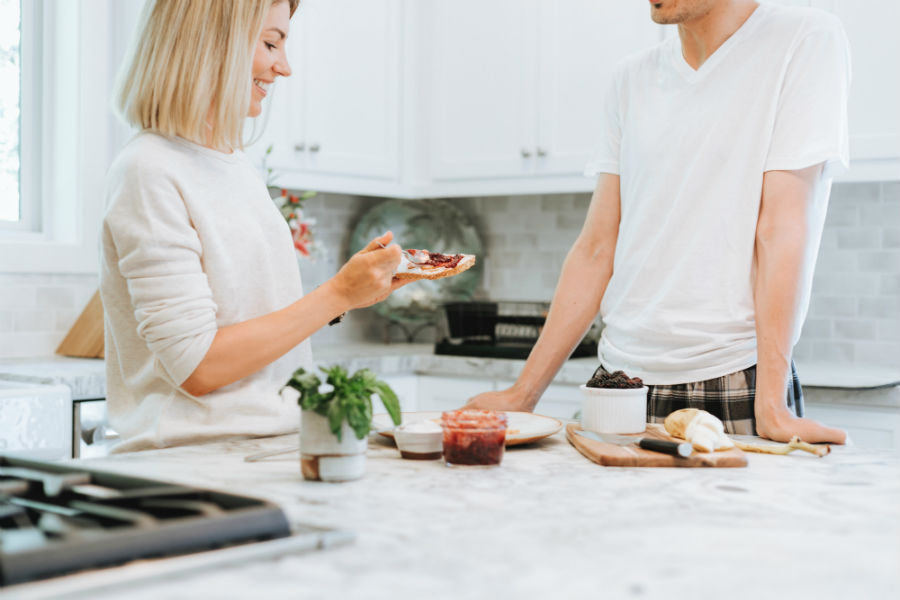Let’s say you’re trying to build a piece of IKEA furniture. You know what the end product is supposed to look like, but for some reason they only sent the directions in Spanish. (In this scenario you took French in high school.) Some of the directions are vaguely familiar, but you can’t understand most of them. You even tried Googling for the directions in English and couldn’t find them. So what do you think are the chances that you’d be able to build that couch or bookshelf correctly? Probably low. And that’s exactly why I’ll never follow intuitive eating, and you shouldn’t either.
Woah woah, you’re thinking, what does intuitive eating have to do with IKEA furniture? That’s a fair question.
Most of us know what intuitive eating is supposed to look like. And even if we didn’t, there are countless Instagram influencers posting content about what it looks like for them. The concepts and end goal are easy, just like it’s simple to understand that basic assembly directions add up to a couch or dresser. All you need to do is listen to your body, eat when you’re hungry, and stop when you aren’t. That should add up to a moderate diet that gives you energy, supports your health goals, and doesn’t leave you feeling deprived.
But participating in diet culture is like throwing out most of the directions.
And, yes, I was a willing participant in diet culture. Maybe you were, too. Even if I didn’t know better, I chose diet after diet. I pushed through hunger and stomach pains and muscle weakness in the pursuit of a smaller pant size. But that doesn’t mean I chose the outcome, which is this: Even if I understand the foundation of intuitive eating, my history of dieting makes it impossible for me to participate. (Luckily, I have a better streak with assembling IKEA furniture.)
What diet culture does to your intuition
We’re talking a lot about diet culture these days. And it’s heartening to see that so many people are fed up with participating. Maybe as a culture we’re all just months away from accepting that diets don’t work. And science backs this up time after time.
But there’s very little talk about what diet culture has taken from us. And trust me, friends, it’s a lot.
We don’t need Jenny Craig or Weight Watchers or South Beach to tell us our calories or to ignore our hunger. We’ve adopted the rules and now impose them on ourselves. Click To TweetDiet culture hasn’t just sabotaged our self-confidence. It has taken away our food neutrality. It has undermined our ability to think of food as something that doesn’t, and shouldn’t, fit neatly inside boxes labeled “good” and “bad.”
It’s taken away our individuality which, by the way, goes down to the cellular fucking level. It tells us we should strive to look the same by eating (or, rather, not eating) the same way. It tells us that if a diet doesn’t work for us, it’s not the diet. It’s just us not trying hard enough.
But perhaps most insidious of all is that diet culture has stripped away even our most basic instincts: when we’re hungry, and when we’re not. (OK, it’s tied with all those times it made you turn down birthday cake. That really stings.)
So it doesn’t matter if you understand that intuitive eating is about listening to your hunger cues. You can’t, or at least shouldn’t, participate if you no longer have them.

Dieting changes how we’re wired
I fully understand that I’m an extreme case. I suffered from an eating disorder for 10 years before I got help. Many men and women go through the same, and worse, though it’s not nearly as pervasive as dieting.
But dieting only primed me for disordered eating. Following South Beach in high school taught me the idea that became my guiding light those 10 long years: It doesn’t matter if you’re hungry, you’ve eaten as much as you deserve.
And even for those of you self-assured enough to not link dieting to self-worth, the message is still to ignore your hunger signals. Each plan claims to know your caloric needs. If you eat those calories and still feel hungry, there’s a reason for it. The programs cite boredom, thirst, cravings, and lack of sleep, among others. Anything but a physical need for more fuel.
Sure, those things do make us want food we don’t actually need. Levels of leptin, the satiety hormone, in our systems drop after a poor night of sleep. Most of us have realized, mid-chip bag, that we’re not actually hungry and continued to eat anyway because we were bored. Or simply because the chips were there. No judgement; I’ve been there.
There are very few foods for which I don’t automatically know the calories. And since I can’t forget this information, my only option is to use it to my advantage. Click To TweetThere are countless reasons you could feel hungry beyond an assigned calorie count. But one of them is needing more food. And it’s dangerous to suggest that this explanation shouldn’t even be considered.
And most of us have been dieting long enough that we no longer need to reference the list. We don’t need Jenny Craig or Weight Watchers or South Beach to tell us our calories or to ignore our hunger. We’ve adopted the rules and now impose them on ourselves.
Where that leaves dieters and intuitive eating
If you ever get the chance, you should watch a kid eat. They eat what they want, skip what they don’t, and stop when they’ve had enough. Some days that might mean eating vegetables. Other days they demand cake and ice cream. There’s no fear of doing it wrong. They don’t question their intuition. You won’t see them feel guilty about passing on green beans for a cookie.
And, sure, eventually kids adopt eating habits from people around them. They’ll begin ignoring their hunger and satiety cues. But before that happens, if you leave them to their own devices, they overwhelmingly listen to their unique wants and needs. Green beans be damned.
This is the existence intuitive eating promises us as adults. Our bodies like to maintain the status quo. That means, theoretically, that you’d never eat enough to see the scale swing more than a couple pounds in either direction.
And there’s the hitch.
If you’ve been stuck in diet culture long enough, you don’t know when you’re hungry. Or when you’re full. You also think of foods as “good” and “bad.”
And, yes, you can train yourself to stop thinking of a cookie as “bad” for you. It takes time, and concerted effort. It isn’t easy to turn off the feelings of shame and failure that diet culture has baked into pastries like butter.
But can you reclaim your hunger signals?
Maybe. But I can’t.
Left on my own, I will generally undereat. I’ve felt, for so long, that I was eating enough to fuel my body, to get healthy. I wasn’t. I’ve now eaten low enough, for long enough, that my hormone production has all but shut down. But my brain told me I was right on track.
Reclaiming calorie counting
I used to relish counting calories. I had one goal: get the number as low as possible every day. It made me feel good and righteous. Finding a new way to shave a couple calories off of my day was a high I chased, and chased, and chased.
So it makes sense that when I got help, the professionals told me to stop counting calories. They told me how to piece together meals by food items, not numbers. I never doubted that they wanted the best for me. But they forgot something essential: the calorie counts were a part of my wiring already.
I can’t look at a meal without doing mental math. There are very few foods for which I don’t automatically know the calories. And since I can’t forget this information, my only option is to use it to my advantage.
Diet culture hasn’t just sabotaged our self-confidence. It has taken away our food neutrality. Click To TweetIt took some time to figure out how many calories my body needs. But thanks to a BMR test and a great deal of trial and error, I’m on the right track. But it’s driven by logic, not bodily intuition. My body stays mostly silent on the matter. It might always.
To properly fuel my body, to care for myself how I deserve, I need to count calories. That number at the end of the day once held me accountable to diet culture, but now holds me accountable to myself.
And you should consider whether it can do the same for you.
And, yes, I mourn the loss of that idyllic picture of myself. Blithely eating my croissant and leaving a quarter behind, both without a second thought. But maybe it’s not about whether my body takes care of itself or my mind does the work. Maybe it’s simply about taking care of myself the way I deserve, the way that works for me. And that’s exactly what I’m doing.
So let’s not demonize counting calories. It could just be the key some of us need to breaking free of diet culture.
Dig deeper
-
What you need to understand about keto, without the controversy
-
From career to weight loss, a scarcity mindset might be holding you back
-
Trying to stop emotional eating is the wrong answer
-
How to not eat like an asshole on vacation, without feeling deprived
-
Was it a binge or did you just overeat? Here’s how to tell
3 thoughts on “Why I’ll never follow intuitive eating, and (maybe) you shouldn’t either”
Comments are closed.

bookmarked!!, I love your website!
Thank you so much, Jeffrey! Let me know if there’s anything in particular you want me to tackle in a new post!
Hey there! This post couldn’t be written any better!
Reading this post reminds me of my old room mate!
He always kept chatting about this. I will forward this article to him.
Fairly certain he will have a good read. Many thanks for sharing!